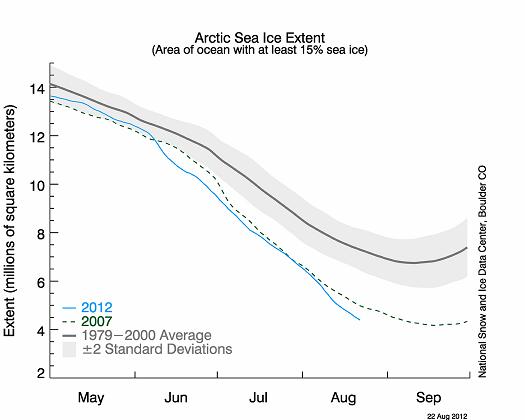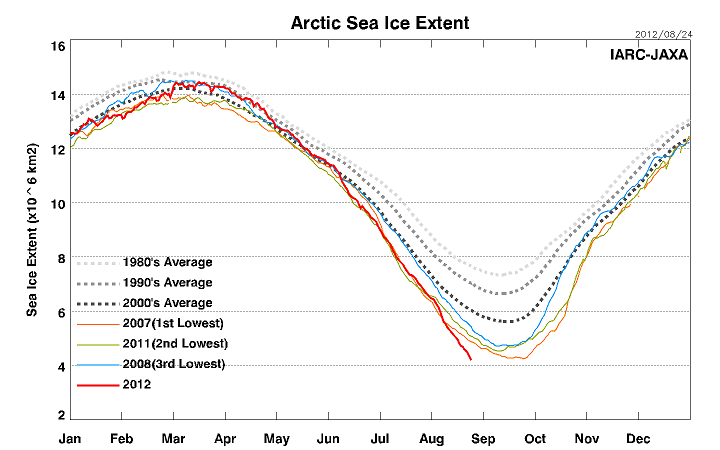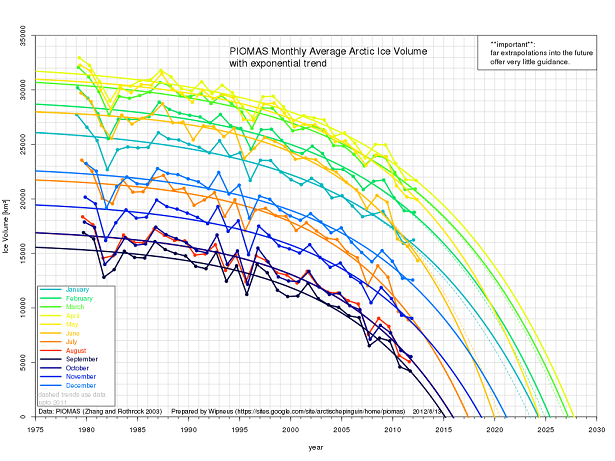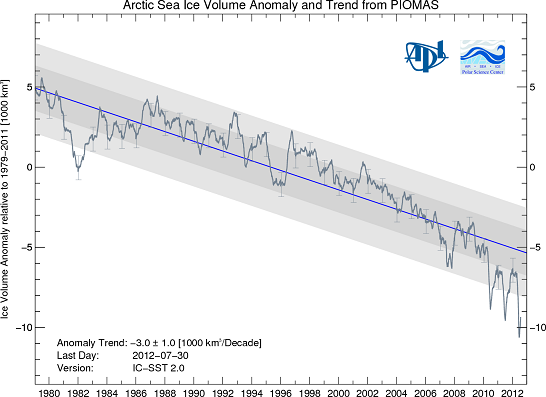It looks like you're using an Ad Blocker.
Please white-list or disable AboveTopSecret.com in your ad-blocking tool.
Thank you.
Some features of ATS will be disabled while you continue to use an ad-blocker.
share:
Arctic sea ice shrinks to record low: Report
www.thestar.com
(visit the link for the full news article)
The area of ice in the Arctic Ocean has thawed to a record low, surpassing the previous 2007 minimum in a sign of climate change transforming the region, according to some scientific estimates.
Related News Links:
www.guardian.co.uk
www.newscientist.com
www.reuters.com
Posting this because it's the first of many reports you can expect to see in the coming week about Arctic Sea Ice hitting new lows in 2012.
According to numerous data sources, many of which can be viewed here, Arctic summer ice melt has already broken the "catastrophic" lows it reached in 2007, even though the end of the traditional melt season is still weeks away.
This is not particularly surprising, considering it's been in an obvious decline since modern records began, however the recent dramatic drop over the last 5 years has caught even the supposedly "alarmist" climate scientists by surprise:
Rate of Arctic summer sea ice loss is 50% higher than predicted
(This must make it extra surprising for the "skeptics", who have all been essentially claiming recovery since the last record in 2007, and were prematurely hi-fiving each other about an apparent return to normal levels back in March).
Anyway though, the big hoopla will most likely come when the record is broken over at NSIDC (any day now), as that's kind of considered the premiere source. As you can see - it's very close:

But I think the most telling image comes from this JAXA graph:

Because here you really get a visual sense of the accelerating melt. Seeing how much the 90's average deviates from the 80's average, and the 2000's from the 90's average, and especially the last few years from the 2000's - it feels almost as if the graph itself is melting.
...
Disappearing Arctic Sea Ice has all sorts of important consequences for the planet - from accelerating global warming (open blue water absorbs more sunlight than shiny white reflective ice) - not to mention the threat of increased methane emissions from beneath the ice (see: Arctic methane leaks threaten climate) - to changing global weather patterns (see: Arctic sea ice may be affecting weather patterns: expert) to regional effects on local wildlife and environment to opening up new fossil fuel reserves for giant oil companies to rush in and exploit and further screw everything up.
It was previously believed that we had at least until mid-century before we saw an ice-free Arctic due to climate change. Now some people believe it could be as soon as mid-decade:

www.thestar.com
(visit the link for the full news article)
According to numerous data sources, many of which can be viewed here, Arctic summer ice melt has already broken the "catastrophic" lows it reached in 2007, even though the end of the traditional melt season is still weeks away.
This is not particularly surprising, considering it's been in an obvious decline since modern records began, however the recent dramatic drop over the last 5 years has caught even the supposedly "alarmist" climate scientists by surprise:
Rate of Arctic summer sea ice loss is 50% higher than predicted
(This must make it extra surprising for the "skeptics", who have all been essentially claiming recovery since the last record in 2007, and were prematurely hi-fiving each other about an apparent return to normal levels back in March).
Anyway though, the big hoopla will most likely come when the record is broken over at NSIDC (any day now), as that's kind of considered the premiere source. As you can see - it's very close:

But I think the most telling image comes from this JAXA graph:

Because here you really get a visual sense of the accelerating melt. Seeing how much the 90's average deviates from the 80's average, and the 2000's from the 90's average, and especially the last few years from the 2000's - it feels almost as if the graph itself is melting.
...
Disappearing Arctic Sea Ice has all sorts of important consequences for the planet - from accelerating global warming (open blue water absorbs more sunlight than shiny white reflective ice) - not to mention the threat of increased methane emissions from beneath the ice (see: Arctic methane leaks threaten climate) - to changing global weather patterns (see: Arctic sea ice may be affecting weather patterns: expert) to regional effects on local wildlife and environment to opening up new fossil fuel reserves for giant oil companies to rush in and exploit and further screw everything up.
It was previously believed that we had at least until mid-century before we saw an ice-free Arctic due to climate change. Now some people believe it could be as soon as mid-decade:

www.thestar.com
(visit the link for the full news article)
edit on 24-8-2012 by mc_squared because: add link
reply to post by mc_squared
On the other hand, Arctic Ice Volume Has Increased 25% Since May, 2008 while Arctic Sea Ice Increases at Record Rate
Antarctica has 90 per cent of the Earth's ice and 80 per cent of its fresh water Antarctic ice is growing, not melting away
20% Increase In Antarctic Ice Since 1979
On the other hand, Arctic Ice Volume Has Increased 25% Since May, 2008 while Arctic Sea Ice Increases at Record Rate
Antarctica has 90 per cent of the Earth's ice and 80 per cent of its fresh water Antarctic ice is growing, not melting away
20% Increase In Antarctic Ice Since 1979
A paper to be published soon by the British Antarctic Survey in the journal Geophysical Research Letters is expected to confirm that over the past 30 years, the area of sea ice around the continent has expanded.
edit on 24-8-2012 by ollncasino because: (no reason given)
Originally posted by ollncasino
reply to post by mc_squared
On the other hand, Arctic Ice Volume Has Increased 25% Since May, 2008 while Arctic Sea Ice Increases at Record Rate
In fact, Antarctica has 90 per cent of the Earth's ice and 80 per cent of its fresh water Link
A paper to be published soon by the British Antarctic Survey in the journal Geophysical Research Letters is expected to confirm that over the past 30 years, the area of sea ice around the continent has expanded.
20% Increase In Antarctic Ice Since 1979
Arctic Ice Volume Has Increased 25% Since May, 2008
edit on 24-8-2012 by ollncasino because: (no reason given)
This article is from February 2009 but it is still an interesting piece to the puzzle over the last 5 years. Record swells in both directions make me think "unstable".
Originally posted by underduck
This article is from February 2009 but it is still an interesting piece to the puzzle over the last 5 years. Record swells in both directions make me think "unstable".
20% Increase In Antarctic Ice Since 1979
The above article is from 2012. The Antarctic has 90% pf the world's ice.
Inconvenient truth: Antarctica sea ice extent growing 1.43% per year
edit on 24-8-2012 by ollncasino because: (no reason given)
reply to post by mc_squared
This is interesting, however in the graphs I would prefer to see those years that are lumped together into an average plotted individually along with the data from 2007 & 2012.
Why did they not plot each year, why use averages?
This is interesting, however in the graphs I would prefer to see those years that are lumped together into an average plotted individually along with the data from 2007 & 2012.
Why did they not plot each year, why use averages?
reply to post by ollncasino
Interesting. An article posting in the comments of one of your articles may give some insight in to how we have records on both sides.
www.newscientist.com...
Unfortunately I am not an expert in this field so I hope someone with more knowledge here can step in and help explain why there is so much fluxing in the data we are seeing.
Interesting. An article posting in the comments of one of your articles may give some insight in to how we have records on both sides.
www.newscientist.com...
Unfortunately I am not an expert in this field so I hope someone with more knowledge here can step in and help explain why there is so much fluxing in the data we are seeing.
Originally posted by CrimsonMoon
reply to post by mc_squared
This is interesting, however in the graphs I would prefer to see those years that are lumped together into an average plotted individually along with the data from 2007 & 2012.
Why did they not plot each year, why use averages?
Here ya go:
reply to post by ollncasino
Arctic Ice Volume has absolutely not increased 25% since May 2008. It has dropped drastically right along with extent and area:

Steve Goddard and WattsUpWithThat.com are not trustworthy sources - they are complete garbage climate denier blogs from unqualified biased amateurs. In fact I already linked to Steve Goddards blog in the OP, showing how he idiotically proclaimed Arctic sea ice back to normal in March. If you read through his comments section in that post you can even see that he even bet one of his commenters as recently as July that we would not see a record minimum this Summer. If you go to his site now, he is backpedaling and acting like a typical denier - ignoring all the data sets showing he lost the bet, and claiming they're all biased and wrong.
Meanwhile Antarctic sea ice has not increased 20% either - this is just more of Goddard's misrepresented denier BS. If you go to NSIDC's site you see it has increased, but only marginally - about 1% per decade - and this is not unexpected as Antarctica has air and ocean currents that protect it from northern influences:
Source: NSIDC
Furthermore, while Antarctic sea ice has remained relatively stable, land ice is clearly melting:
Is Antarctica losing or gaining ice?
Arctic Ice Volume has absolutely not increased 25% since May 2008. It has dropped drastically right along with extent and area:

Steve Goddard and WattsUpWithThat.com are not trustworthy sources - they are complete garbage climate denier blogs from unqualified biased amateurs. In fact I already linked to Steve Goddards blog in the OP, showing how he idiotically proclaimed Arctic sea ice back to normal in March. If you read through his comments section in that post you can even see that he even bet one of his commenters as recently as July that we would not see a record minimum this Summer. If you go to his site now, he is backpedaling and acting like a typical denier - ignoring all the data sets showing he lost the bet, and claiming they're all biased and wrong.
Meanwhile Antarctic sea ice has not increased 20% either - this is just more of Goddard's misrepresented denier BS. If you go to NSIDC's site you see it has increased, but only marginally - about 1% per decade - and this is not unexpected as Antarctica has air and ocean currents that protect it from northern influences:
The Antarctic is almost a geographic opposite of the Arctic, because Antarctica is a land mass surrounded by an ocean.
In the Antarctic, the currents and winds tend to flow without interruption around the continent in a west-to-east direction, acting like a barricade to warmer air and water to the north. In contrast, the Arctic region north of the Atlantic Ocean is open to the warmer waters from the south, because of the way the ocean currents flow.
Source: NSIDC
Furthermore, while Antarctic sea ice has remained relatively stable, land ice is clearly melting:
Is Antarctica losing or gaining ice?
Satellites measure Antarctica is gaining sea ice but losing land ice at an accelerating rate which has implications for sea level rise.
Originally posted by ollncasino
reply to post by mc_squared
On the other hand, Arctic Ice Volume Has Increased 25% Since May, 2008 while Arctic Sea Ice Increases at Record Rate
Antarctica has 90 per cent of the Earth's ice and 80 per cent of its fresh water Antarctic ice is growing, not melting away
20% Increase In Antarctic Ice Since 1979
A paper to be published soon by the British Antarctic Survey in the journal Geophysical Research Letters is expected to confirm that over the past 30 years, the area of sea ice around the continent has expanded.
edit on 24-8-2012 by ollncasino because: (no reason given)
Well, why did you have to show up with the - whole truth - and spoil the party?
We are trying to gain control of the general population with - fear and deception -.
Take your big picture analysis and get out of here!
--------------
Just kidding. Thank you for your post.
Yes, the ice is increasing however i read on another thread that we have been
cheating a little.
- Geoengineering -
This is very interesting to read about.
- Wikipedia - Geoengineering
Originally posted by mc_squared
Originally posted by CrimsonMoon
reply to post by mc_squared
This is interesting, however in the graphs I would prefer to see those years that are lumped together into an average plotted individually along with the data from 2007 & 2012.
Why did they not plot each year, why use averages?
Here ya go:
To me this shows a severe down trend in the amount of ice. Even the jumps after 2007 dont come close to reaching the levels before that. Add another dip in 2012 and the trend is unmistakeable.
reply to post by underduck
The planet Earth has been warming and cooling for millions of years.
Try not to be an alarmist.
We have all read the ClimateGate emails.
---------
BTW, it's the sun warming the Earth not evil mankind.
That's why we have had dozens of ice ages in the past when man did not exist on Earth.
Seek the truth.
The planet Earth has been warming and cooling for millions of years.
Try not to be an alarmist.
We have all read the ClimateGate emails.
---------
BTW, it's the sun warming the Earth not evil mankind.
That's why we have had dozens of ice ages in the past when man did not exist on Earth.
Seek the truth.
Originally posted by Eurisko2012
reply to post by underduck
The planet Earth has been warming and cooling for millions of years.
Try not to be an alarmist.
We have all read the ClimateGate emails.
---------
BTW, it's the sun warming the Earth not evil mankind.
That's why we have had dozens of ice ages in the past when man did not exist on Earth.
Seek the truth.
First of all I am not being an alarmist. I am just looking at the OP's data. I didn't say anything except that it was "interesting". Secondly, I never suspected whether or not that humans had anything to do with it.
You appear to be the one here with an agenda.
Oh and I did a little bit of research on this Steven Goddard ... not good.
wattsupwiththat.com...
www.skepticalscience.com...
edit on 24-8-2012 by underduck because: (no reason given)
reply to post by underduck
It may be interesting but it's also - misleading -.
The Al Gore - hockey stick - graph is also misleading.
Global warming was never about climate change.
It was always about gaining control over the general population using - fear & deception -.
------------
Food for thought:
The next ice age is - always - on the way.
We are due for another ice age in about 1,500 years.
We do not have the technology or the means to stop it.
Ice ages are completely natural. Don't fear them.
It may be interesting but it's also - misleading -.
The Al Gore - hockey stick - graph is also misleading.
Global warming was never about climate change.
It was always about gaining control over the general population using - fear & deception -.
------------
Food for thought:
The next ice age is - always - on the way.
We are due for another ice age in about 1,500 years.
We do not have the technology or the means to stop it.
Ice ages are completely natural. Don't fear them.
reply to post by Eurisko2012
You seem to have me mistaken for somebody else. I am not afraid of ice ages or climate change. I dont know what causes them and I dont really care. I am interested in the changes that are happening and seeing what will happen. The OP's data looks solid and I am looking into it more.
You seem to have me mistaken for somebody else. I am not afraid of ice ages or climate change. I dont know what causes them and I dont really care. I am interested in the changes that are happening and seeing what will happen. The OP's data looks solid and I am looking into it more.
Originally posted by underduck
reply to post by Eurisko2012
You seem to have me mistaken for somebody else. I am not afraid of ice ages or climate change. I dont know what causes them and I dont really care. I am interested in the changes that are happening and seeing what will happen. The OP's data looks solid and I am looking into it more.
Enjoy your research but beware of misleading information and alarmists.
The ClimateGate emails revealed the truth.
The scientists cooked the numbers in order to get more funding to study global
warming. In other words, tell us what we want to hear and we will give you another check.
Just a general question as per how will/does it affect the earth's wobble if the arctic is losing and antartic is gaining the ice? Would love to see
a gif or animation of somesort if someone has one to see the new wobble.
edit on 24-8-2012 by hp1229 because: (no reason given)
Originally posted by hp1229
Just a general question as per how will/does it affect the earth's wobble if the arctic is losing and antartic is gaining the ice? Would love to see a gif or animation of somesort if someone has one to see the new wobble.edit on 24-8-2012 by hp1229 because: (no reason given)
The Earth rotates on its axis at an angle of 23.5 degrees.
The tilt gives us 4 seasons here in the USA.
I don't want to hear anything more about ice increasing. We're still in the ice age for half the year up here in the Upper Peninsula. If you haven't
got anything good to say, don't say anything. I wanna hear it's going to be like Florida up here in the future.
edit on 24-8-2012 by
rickymouse because: (no reason given)
reply to post by mc_squared
It is becoming increasingly apparent that the Earth's climate is changing. Regardless of whether we believe that humans are involved, and to what extent, or if the changes are a natural progression of the planet's evolution is immaterial. The fact is that our home is or will change.
This makes it imperative that preparations begin to address these changes and the consequences for humanity and all life. The changes may not cause an instant global cataclysm, but will more likely impact local and regional areas causing mass migrations of people and the loss of many plant and animal species.
Survivalists are interested in what they can do to save themselves and their families following some catastrophic event. The fact is that everyone's life will end sometime in the future regardless of what we do to prevent it. Should we not consider what can be done now to ensure the survival of those generations to come and the species of our planet?
There are many ideas about actions that can be taken, but few have taken action. It could be interesting to consider the ideas of people who frequent this site and have the ability to think "outside the box."
It is becoming increasingly apparent that the Earth's climate is changing. Regardless of whether we believe that humans are involved, and to what extent, or if the changes are a natural progression of the planet's evolution is immaterial. The fact is that our home is or will change.
This makes it imperative that preparations begin to address these changes and the consequences for humanity and all life. The changes may not cause an instant global cataclysm, but will more likely impact local and regional areas causing mass migrations of people and the loss of many plant and animal species.
Survivalists are interested in what they can do to save themselves and their families following some catastrophic event. The fact is that everyone's life will end sometime in the future regardless of what we do to prevent it. Should we not consider what can be done now to ensure the survival of those generations to come and the species of our planet?
There are many ideas about actions that can be taken, but few have taken action. It could be interesting to consider the ideas of people who frequent this site and have the ability to think "outside the box."
new topics
-
Azerbaijan E190 Passenger Jet Shot Down by Russia
Mainstream News: 40 minutes ago -
Orange County Makes Shoplifting a Felony
Other Current Events: 4 hours ago -
It's Offical Now
US Political Madness: 7 hours ago -
The reason it works is.....
General Chit Chat: 7 hours ago -
Dick Van Dyke saved from Wildfire by neighbours on his 99th birthday
People: 10 hours ago
top topics
-
Orange County Makes Shoplifting a Felony
Other Current Events: 4 hours ago, 13 flags -
It's Offical Now
US Political Madness: 7 hours ago, 11 flags -
The reason it works is.....
General Chit Chat: 7 hours ago, 7 flags -
Dick Van Dyke saved from Wildfire by neighbours on his 99th birthday
People: 10 hours ago, 5 flags -
Azerbaijan E190 Passenger Jet Shot Down by Russia
Mainstream News: 40 minutes ago, 4 flags
active topics
-
Azerbaijan E190 Passenger Jet Shot Down by Russia
Mainstream News • 5 • : Naftalin -
Orange County Makes Shoplifting a Felony
Other Current Events • 19 • : Coelacanth55 -
It's Offical Now
US Political Madness • 10 • : rickymouse -
The Acronym Game .. Pt.4
General Chit Chat • 1027 • : FullHeathen -
NYPD arrests migrant who allegedly set woman on fire on subway train, watched her burn to death
Breaking Alternative News • 54 • : Irishhaf -
Christmas Dinner ??
Food and Cooking • 18 • : network dude -
-@TH3WH17ERABB17- -Q- ---TIME TO SHOW THE WORLD--- -Part- --44--
Dissecting Disinformation • 3810 • : 777Vader -
Post A Funny (T&C Friendly) Pic Part IV: The LOL awakens!
General Chit Chat • 7953 • : underpass61 -
Dick Van Dyke saved from Wildfire by neighbours on his 99th birthday
People • 1 • : soulrevival -
The reason it works is.....
General Chit Chat • 3 • : BeyondKnowledge3
